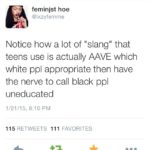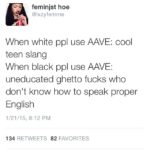If you believe that AAVE is not cultural appropriation, you are going to want to stop reading this and respond to me multiple times throughout the post. Don’t. Read it all the way through.
________________________
89% of the time, this is the argument for why cultural appropriation is okay:
“Don’t you want to share your culture with other people?!”
Especially to people who lack a “culture,” the answer may come as a surprise to you: no. I do not want to share something that you do not understand, that you have no connection to whatsoever, that you commodify for these reasons—I don’t want to share my culture with you.
Particularly, AAVE.
AAVE is a language. This means it has its own grammatical structure, vocabulary, nuances and means of communication. It is a language that I speak and understand around family and black friends. It is, like all other languages, best understood if learned from birth than if adopted later in life.
It isn’t “cool” or “wrong” or “funny,” but a language that when spoken by me is as normal to my tongue as American English.
When people who are not first-language AAVE speakers use AAVE, it is often
- In jest (why do black people pronounce words wrong let me do it to imitate people I think are more stupid than me), or
- Used to look cool (I think using AAVE in my slam poetry for open mic night will make it so deep; I am a white anarchist but I use AAVE because I’m urban and inclusive; that’s so dope! sup bro! ratchet! ill! this shirt is bad!)
I know what you’re thinking: this is just a language and languages are adopted all the time. Here is why you are ignorant and wrong and what is happening is actually appropriation:
The most important feature of appropriation is the stealing of something from another culture and changing-meaning of, either by diluting the meaning or just changing the meaning in general, the cultural thing that has been stolen. Guess what non-AAVE speakers?
When you use AAVE: You don’t use the shit correctly.
When you insert random AAVE into your conversation, it is equivalent to taking a word randomly from one language and using it in an English sentence. In cases where translations are direct (objects), this is usually fine and doesn’t change the meaning at all. In cases where the translation is not direct, you are literally (follow the logic)
- taking a word that your language does not have a meaning for and then
- changing the meaning of that word to fit into the context of your language and life.
Especially with regard to AAVE stolen from popular black media, which is more available to non-AAVE speakers and is therefore more accessed and appropriated, non-AAVE speaking audiences will adopt the word and, using the only language context they know, will unknowingly change the meaning of the word just because it’s what makes sense to them.
The problem is that AAVE takes more than context clues. In AAVE, the way a thing is said can change the meaning of it. It is not a tonal language, but a lot of things in AAVE are implied, which is why many black people do what is considered rude and “interrupt” someone when they’re talking.
The truth is that we have learned from a very young age to anticipate meaning in a sentence and oftentimes, especially because AAVE is our first language, will naturally do this (even when the meaning we interpret is incorrect). It is also AAVE-speaking customary to interrupt someone while they are talking, because since we have already anticipated the ending of a sentence, it’s not necessary for them to finish it.
Because of the social standing of Blacks in the US, a lot of AAVE is taken and appropriated to mean something negative or pejorative even when it is not meant to be so.
Taking examples from popular media of AAVE being taken and appropriated, I will use the popular and commonly mistaken Ratchet Girl Anthem (video starts at 1:35). Before analyzing what the word ratchet really means vs. how AAVE-appropriators use it, I would like to point out how cultural appropriation of AAVE takes place in the first place:
- Person who is non-AAVE speaking hears this song
- Person hears the word “ratchet,” which is not currently a word/does not have meaning in their vocabulary
- Person concludes using context clues and inflection of the singers’ voices that “ratchet” indeed is something undesirable
- Because of social standing of Blacks and the various stereotypes of Black people in the club are played up in this song, the person assumes the word “ratchet” must relate to qualities of Black culture that society has deemed “undesirable”
- Person associates the word “ratchet” with all negative stereotypes of black people, even when that is not what the word is used for, because that is what makes sense to them in their lingo-social context
And if you are a non-AAVE speaker, think of how you’ve been using the word, “ratchet.” If someone is loud or boisterous, a quality associated with “negative aspects of Black culture,” you might call them ratchet. If you pass a black person up and they do something you deem “ghetto,” you might call them ratchet.
At this point, the word goes on to take a meaning that can be substituted for any negative thing or event you as a non-AAVE speaker encounter. Burn a cake? Ratchet. Clumsily trip over a backpack? Ratchet. Someone cuts you off? Ratchet.
But here’s the thing:
Ratchet simply means (and fellow Black brethren please help me translate this) to be poorly suited. To not be dressed your best. To look bad.
Seriously. Look at when they use it in the song:
OMG, what do she have on? (She ratchet)
Her lace front is all wrong. (She ratchet)
Boy bye, not with them shoes on (He ratchet)AAVE speakers pick up on this immediately, because we are able to discern what exactly they’re labeling as “ratchet.” Non-AAVE speakers will hear the whole song—the part where they glorify child support, and babydaddies getting out of prison, and getting new merchandise—and incorrectly assume these things (which are also stereotypically considered the be negative qualities of Black culture) are included in the ratchet part.
You have to remember, as a non-AAVE speaker, you may learn the occasional word, but there is a whole grammatical structure that you do not understand at all and it inhibits your comprehension of rap songs. It is easy to believe you understand it, but why do you think black people laugh when non-AAVE speakers cover rap songs, or use words they heard from rap songs?
When you cover a rap song, it is equivalent to a poor Spanish speaker covering a Spanish song; when you use words you hear from rap songs, you often use them incorrectly even without knowing.
The problem, though, is that 75% of this country is white, and most of those white people are using words they’ve adopted from AAVE. Incorrectly. When they change the meanings of these words, it’s appropriation.
Why that is more harmful than you think:
The case of ratchet, where a word that is used to describe someone’s attire is incorrectly attributed to negative aspects of the whole black race, is indicative of most cultural appropriation of AAVE. AAVE ends up being appropriated by non-AAVE speakers and then used against AAVE speakers, a group that is 99.9999% black. Words in AAVE that don’t mean anything negative will, when appropriated, become negative in meaning or negative in connotation simply because they are words that originated from black culture.
Most importantly It’s an unspoken rule that AAVE, when spoken by white people, is cute, not ignorant, and playful. When spoken by black people, it’s “ghetto.” AAVE spoken by a white person can cost them respectability or professionalism; AAVE when spoken by black people can cost them a job, opportunities, and even their own livelihood. If a you passed up a white person speaking AAVE, you’d think, “He’s playing around.” If you passed a black person speaking it, even if they were playing around, you’d think, “Why can’t they speak English correctly?”
Most importantly, it creates a false sense in oppressors that we are all laughing at the same thing. When black people laugh at AAVE, we are laughing at the language and how it is used. When non-AAVE speakers laugh at AAVE, you are laughing at blackness; you’re laughing at what you think is more ignorant and stupid than you.
Because you don’t understand.
Do you see why I would not want you to “share” that part of my culture? That isn’t sharing at all. That’s bastardizing.
aave
FUCKING PREACH TO ME, LET THESE [WHITE] FOLKS KNOW WHERE THEY ‘SLANG’ CAME FROM!!!!!
I’m actually writing a research paper on this
Let me know how it goes bro I really wouldn’t mind reading it
Calling each other “man” originated in the Harlem Renaissance when black musicians, tired of white men always calling them “boy” started calling each OTHER “man”.
As in: “Hey, man, how you doin’?”
Of course, our modern stereotype for the person who says “man” a lot is a white hippie with long hair or a white beatnik in a turtleneck and beret–a look (and movement) that white people stole wholecloth from black people.
“Cool” is another slang word black people created, but I don’t recall the date this one was coined, only that it was always in another phrase that has since been dropped–“cool cat”, as in, a man who is always level-headed, and very suave. ‘Cool’ has since come to be a stand-in word for an aesthetic or overarching style with ephemeral, impossible-to-overtly-state qualities of allure and fascination. Yes, we invented that, too. We invented that word. We gave a definition to the inexplicable sensation of awe some people are able to inspire in others by sheer style.
Unfortunately the word “cool” has also been stolen and our stereotype of a person who uses it a lot is a white boy with a skateboard or surfboard…
^^^^^^^^^^^^^^^^^^^^^^^^^^^^^!!!!!!!
I really wish y’all would understand that AAVE is a legitimate form of English just like Gullah and Patois and isn’t just a bunch of random words thrown together like fuckboy and thot…
It’s really insulting actually that you guys think of it that way. Whenever y’all comprise lists of what AAVE is it’s literally just a bunch of slang that you hear on social media with no mention of how some of us say “yo” instead of “your” or “finna” instead of “about to” or “gone” instead of “going to” and those are the words that deem black people unintelligent most of the time because it’s not just a bunch of cool catchy sayings that young black people use. So when people think of AAVE they just think it’s something related to being a young black person because all that slang is only used by us.
My grandparents use AAVE, my mom uses it, it holds a lot more weight than just calling people fuckboys…








